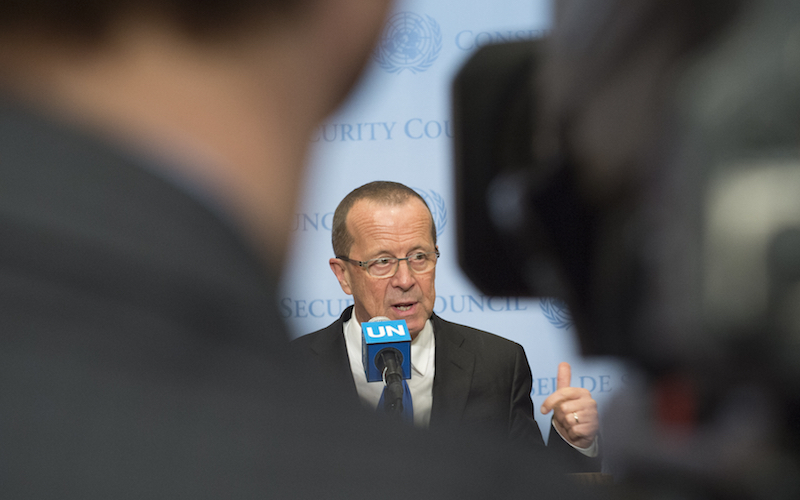
A Non-Consensual Government in Libya
Having the consent of the governed is a political philosophy that dates back at least to the 15th Century and has flowed from the ink wells of such noted western thinkers as John Locke and John Milton. The idea is so essential to western thought that the phrase “consent of the governed” is literally written into the Declaration of Independence. And “The will of the people shall be the basis of the authority of government” is written in the UN’s Universal Declaration of Human Rights.
It is surprising and shocking therefore, that Martin Kobler, the United Nations Envoy to Libya declared in his recent remarks to UN that the plan to create a new government in Libya may not actually need the approval of Libyans.
Kobler’s comments are especially shocking because the UN plan itself, as a condition of establishing a new “Government of National Accord,” requires that it win official approval from both existing Libyan government groups, the House of Representatives (HoR) and the General National Congress (GNC) and that specific other constitutional steps and requirements are met.
But after traveling to Libya to personally “help” the HoR vote on the UN plan and seeing that approval stall, Kobler returned to New Yok to declare, “Failing…a positive endorsement by the House of Representatives by early next week, Libyans have to go on. I intend to reconvene the Libyan Political Dialogue to explore the way forward in line with the Libyan Political Agreement.” Kobler continued, “…This is the plan there are no alternatives.”
Even though the plan itself requires approval and consent of government is a bedrock concept of free people, Kobler and the UN now think such approval is optional. Or, at least, they think they can “go on” without it.
This approach is neither smart not practical.
First, moving ahead with the UN plan without receiving approval from an elected government body in Libya will give even more political ammunition to those in the region who want to weaken and discredit western influence and leadership.
The ‘go ahead with or without them’ approach also overlooks that this plan, the UN “National Accord” plan, is the same plan that was drafted by disgraced and discredited former Libyan envoy Bernardino Leon. Few things could be more destructive to the efforts to work with the west than the forced implementation of a new, western-designed government drafted in a corrupt process. The volume of the “we told you so” chorus among the most radical, anti-western voices will be deafening.
Going further, most Libyan observers agree that, between the HoR and GNC, the UN plan was far more likely to win approval in the HoR. Before the Leon/Kobler “National Accord” took shape in the UN, the HoR was the “internationally recognized” entity in Libya – it had been the body sending the Libyan Ambassador to New York and the assembly that had the majority of access to western foreign leaders. It says a great deal that this, seemingly more pro-western group has not approved the new plan.
And what can anyone expect the GNC government, having been repeatedly overlooked by western diplomacy, to do now that the HoR won’t even approve the new plan? What will the approach be when neither the HoR nor the GNC sign-off?
That’s why the Kobler plan to move ahead without political consent in Libya is impractical. It’s not smart because the only sensible way to build a lasting government in Libya is to build a government designed and built by Libyans – and with their approval.
If the UN succeeds in creating the “National Accord” government which seems less and less likely and Libyans never embrace it which seems almost certain. it won’t stick. With a weak, foreign-inserted government in place, Libyan leaders of all motivation will simply posture for prominence once that government falls. In that scenario, it’s impossible to see a UN government that was not approved by any legal authority having the resources to be functional let alone survive. No local leaders, whether tribal, political or military will surrender the slightest treasure in aid of a government they view as doomed to fail.
Which raises the question, how long will the western nations backing the Kobler/Leon plan write checks to support the isolated government is creates – assuming they succeed in seating it in the first place?
As of now, the US, for example, is still strongly supporting the move-ahead-anyway plan. After Kobler made his UN presentation, US Secretary of State Kerry met with Kobler and the State Department issued a statement which said, “Secretary Kerry made clear that the United States will continue to support…the Government of National Accord as they take their rightful place in Tripoli.”
“Rightful place” is pretty strong considering now one outside of New York has officially approved the plan.
Even if the “National Accord” government does get seated in Tripoli, now based in Tunisia, it will absolutely test the will of the United States and others to continue to stand behind it. Because, if that happens, it’s likely few in Libya will.
Which begs the overarching, fundamental question about the entire “National Accord” exercise – how can the UN, or any nation, credibly erect a government for others without the consent of the governed?
The clear answer is it cannot. By trying, either the intended government or western credibility will be shattered – likely both.

